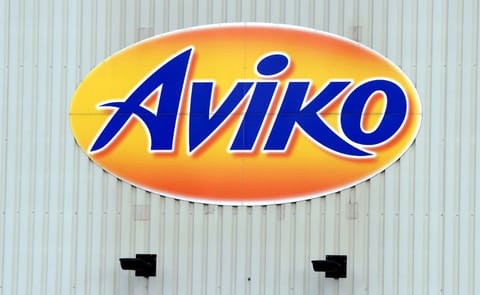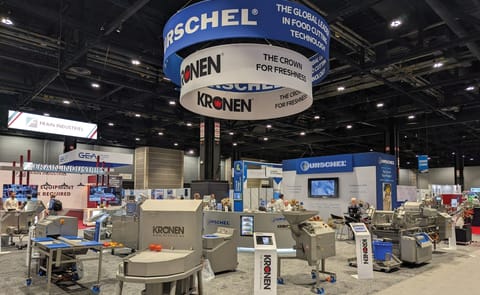Reser’s Fine Foods opens new state-of-the-art potato processing plant in Pasco, Washington

From spuds to famous potato salad. Reser’s opens new state-of-the-art Pasco plant
A new Reser’s Fine Foods plant in Pasco is a testament to how the company, which started in a farmhouse kitchen, became one of the most successful private businesses in the country.
Oregon-based Reser’s opened its Tri-Cities plant in 1999, making the company’s signature potato salad. Plant General Manager Rob Wiskerchen said that when the side dish business took off in 2005, the facility became known as the company’s “Swiss Army knife” thanks to its ability to adjust to the company’s needs.
That dexterity helped ensure that when the company needed a versatile new plant, Pasco was at the top of the list. The new 170,000-square-foot facility is now up and running, capable of producing potato salads, mashed potatoes and macaroni.
And an expansion is already in the works and will add an estimate 70,000 square feet for hot food processing capabilities. While Reser’s has a wide variety of products, including side dishes, Mexican food and its Main Street Bistro line of take-and-bake trays, the Pasco facility will remain focused on the company’s most popular potato dishes.
While Reser’s has a wide variety of products, including side dishes, Mexican food and its Main Street Bistro line of take-and-bake trays, the Pasco facility will remain focused on the company’s most popular potato dishes.
At a grand opening ceremony Wednesday, Wiskerchen and his team led tours of the new plant, and thanked the community partners who made it possible.
Rob Wiskerchen:
They’re continuing to hire for the new facility, and will need to bring on even more employees once the expansion and remodel projects are complete. About 20,000 square feet of the new facility is dedicated to office and employee spaces, such as break rooms, locker rooms and supply areas.
 CEO Mark Reser said he’s been involved in bringing 10 plants online, but this one presented unique challenges due to the COVID-19 pandemic. He said that just a year ago, peas were still being harvested on the site where the plant now stands, and with a global supply chain slowdown, they weren’t sure if they would be able to get the parts they needed to build the plant or the equipment to run it. There also was a crane collapse early on during construction of the structural steel last November.
CEO Mark Reser said he’s been involved in bringing 10 plants online, but this one presented unique challenges due to the COVID-19 pandemic. He said that just a year ago, peas were still being harvested on the site where the plant now stands, and with a global supply chain slowdown, they weren’t sure if they would be able to get the parts they needed to build the plant or the equipment to run it. There also was a crane collapse early on during construction of the structural steel last November.
 Thanks to a community-wide effort, they managed to pull it off, with the first truckload of potatoes arriving at the end of June. Mark Reser:
Thanks to a community-wide effort, they managed to pull it off, with the first truckload of potatoes arriving at the end of June. Mark Reser:
Mark Reser:
Million Pounds Daily
It takes a lot of equipment to process a million pounds of food each day. When trucks arrive, potatoes are offloaded straight into a machine to be sorted and remove any debris. From there they make their way through the facility without ever being touched by a human hand, until they’re ready to head to market.
Workers guide each step, but a hands-off process makes for safer production, Wiskerchen said. Employees work in three shifts — two shifts for production and one for cleaning. After being sorted, the potatoes are moved along to another set of machines to be cleaned, with bins the size of 18-wheeler trailers staging the different varieties. They’re then sent through a dicer and pumped into cooking vats that resemble gas tankers.
The water used in the process is recaptured for irrigation, Wiskerchen said. Nearby large tanks are used to mix butter and spices, with cookers on hand in case they need to process macaroni, the cheese sauce for it or even mixed vegetables for potato salad.
The cooked potatoes are then pumped along to be packaged, with employees monitoring the line as the food is sorted into individual tubs, trays and containers. Then the packaged food is labeled and moved into a chilling area with more than five miles of coils, where thousands of containers can be cooled at a time. From there the food is loaded onto trucks and makes its way to grocery stores nationwide.
Oregon-based Reser’s opened its Tri-Cities plant in 1999, making the company’s signature potato salad. Plant General Manager Rob Wiskerchen said that when the side dish business took off in 2005, the facility became known as the company’s “Swiss Army knife” thanks to its ability to adjust to the company’s needs.
That dexterity helped ensure that when the company needed a versatile new plant, Pasco was at the top of the list. The new 170,000-square-foot facility is now up and running, capable of producing potato salads, mashed potatoes and macaroni.
And an expansion is already in the works and will add an estimate 70,000 square feet for hot food processing capabilities. While Reser’s has a wide variety of products, including side dishes, Mexican food and its Main Street Bistro line of take-and-bake trays, the Pasco facility will remain focused on the company’s most popular potato dishes.
While Reser’s has a wide variety of products, including side dishes, Mexican food and its Main Street Bistro line of take-and-bake trays, the Pasco facility will remain focused on the company’s most popular potato dishes.
At a grand opening ceremony Wednesday, Wiskerchen and his team led tours of the new plant, and thanked the community partners who made it possible.
Rob Wiskerchen:
"Next year they’ll add ovens and we’ll end up with a Swiss Army knife that’s three times the size of the old plant, and should be capable of doing a million pounds of food that people love to eat, each and every day. (It represents) a huge investment in the facility, huge investment in our people and huge investment in our community."Now that the employees have shifted to the new facility, the old one will be remodeled, eventually bringing Reser’s up to about 350,000 square feet of processing in Pasco, representing an investment of more than USD 120 million.
They’re continuing to hire for the new facility, and will need to bring on even more employees once the expansion and remodel projects are complete. About 20,000 square feet of the new facility is dedicated to office and employee spaces, such as break rooms, locker rooms and supply areas.

Mark Reser, president of Reser’s Fine Foods, speaks to a crowd during Wednesday’s celebration outside the food company’s newest production facility in Pasco, Wash. The plant will make the company’s signature potato salad and more.(Courtesy: Bob Brawdy)

Pasco emergency rescue crews responded to a building collapse at the construction site of a new processing plant for Reser’s Fine Foods. (Courtesy: Cameron Probert)
"This facility represents our commitment to growing a sustainable family business."Today, the company has 14 plants and 4,500 employees nationwide. A remarkable journey for a business that started in his grandmother’s Cornelius, Ore,. kitchen in 1950. Even without the new state-of-the-art capabilities, the Pasco plant was named Reser’s plant of the year last year, and Reser has a feeling they’ve got a good shot at repeating.
Mark Reser:
"Pasco achieved that without this amazing facility. For me, this is the start of something new and possibly the first plant to ever get Plant of the Year two years in a row."Amazon’s two, 1-million square-foot warehouses are expected to open next year, while Darigold broke ground on a USD 600 million processing facility earlier this month.
Million Pounds Daily
It takes a lot of equipment to process a million pounds of food each day. When trucks arrive, potatoes are offloaded straight into a machine to be sorted and remove any debris. From there they make their way through the facility without ever being touched by a human hand, until they’re ready to head to market.
Workers guide each step, but a hands-off process makes for safer production, Wiskerchen said. Employees work in three shifts — two shifts for production and one for cleaning. After being sorted, the potatoes are moved along to another set of machines to be cleaned, with bins the size of 18-wheeler trailers staging the different varieties. They’re then sent through a dicer and pumped into cooking vats that resemble gas tankers.
The water used in the process is recaptured for irrigation, Wiskerchen said. Nearby large tanks are used to mix butter and spices, with cookers on hand in case they need to process macaroni, the cheese sauce for it or even mixed vegetables for potato salad.
The cooked potatoes are then pumped along to be packaged, with employees monitoring the line as the food is sorted into individual tubs, trays and containers. Then the packaged food is labeled and moved into a chilling area with more than five miles of coils, where thousands of containers can be cooled at a time. From there the food is loaded onto trucks and makes its way to grocery stores nationwide.
Like to receive news like this by email? Join and Subscribe!
Get the latest potato industry news straight to your WhatsApp. Join the PotatoPro WhatsApp Community!
Highlighted Company
Sponsored Content
Sponsored Content
Sponsored Content
Sponsored Content








